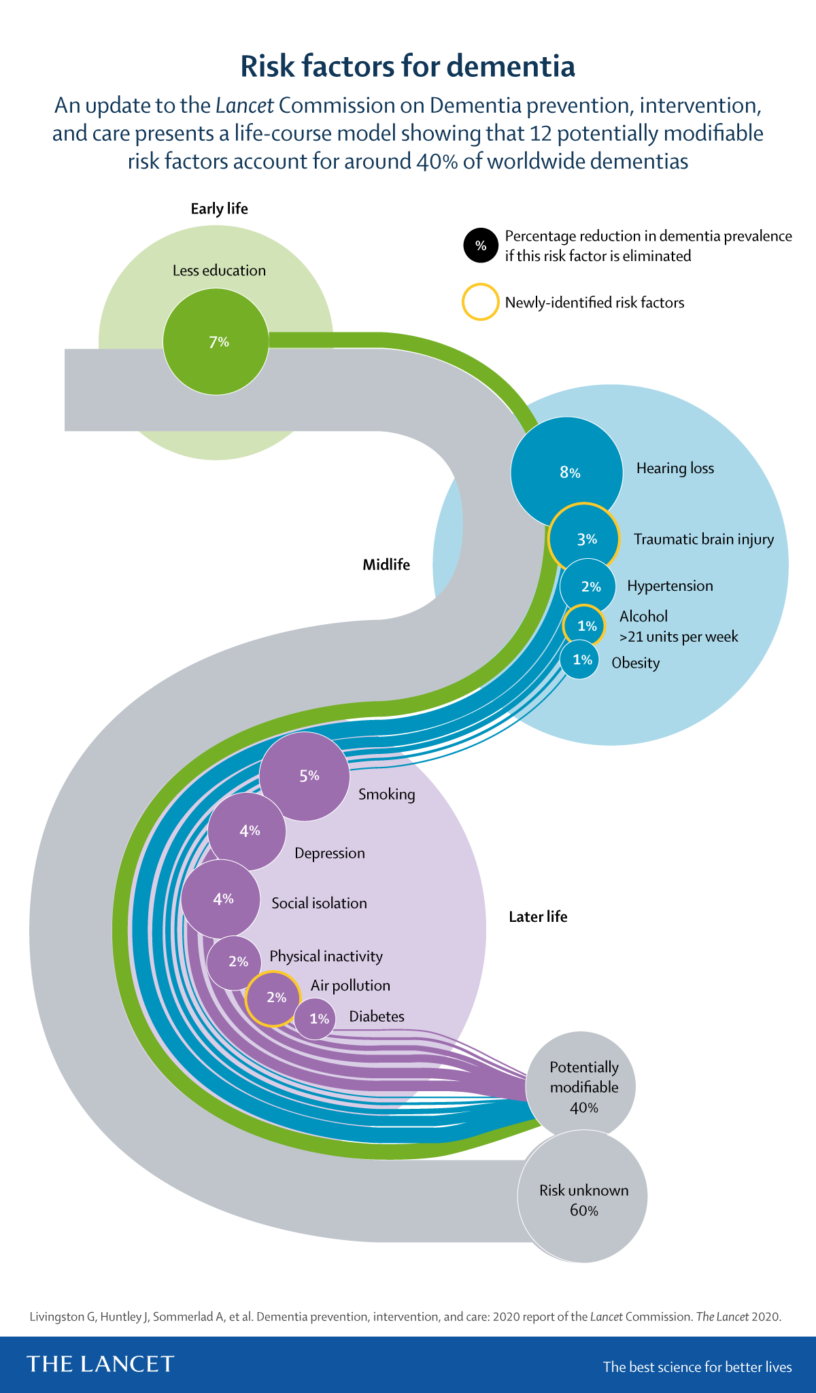 Dementia is a devastating condition that affects millions of people worldwide, with significant impacts on individuals, families, and society. According to the World Health Organization (WHO), there are approximately 50 million people living with dementia globally, and this number is expected to triple by 2050.
Dementia is a devastating condition that affects millions of people worldwide, with significant impacts on individuals, families, and society. According to the World Health Organization (WHO), there are approximately 50 million people living with dementia globally, and this number is expected to triple by 2050.
The Lancet Commission on dementia prevention, intervention, and care has identified 12 modifiable risk factors for dementia. In this article, we’ll explore these risk factors and learn what steps individuals can take to reduce their risk of developing dementia.
Modifiable Risk Factors for Dementia
The Lancet Commission’s life-course model of nine risk factors for dementia included less education, hypertension, hearing impairment, smoking, obesity, depression, physical inactivity, diabetes, and infrequent social contact. The latest study has added three new modifiable risk factors to the list: excessive alcohol consumption, head injury, and air pollution.
Modifying all 12 risk factors might prevent or delay up to 40% of dementias. The Lancet Commission emphasizes the importance of ambitious prevention measures to tackle the rising burden of dementia globally.
Specific Actions for Risk Factors Across the Life Course
The Lancet Commission identified specific actions that individuals can take to reduce their risk of developing dementia:
- Maintain systolic blood pressure (BP) of 130 mm Hg or less in midlife from around age 40 years. Antihypertensive treatment for hypertension is the only known effective preventive medication for dementia.
- Use hearing aids for hearing loss, and reduce hearing loss by protection of ears from excessive noise exposure.
- Reduce exposure to air pollution and second-hand tobacco smoke.
- Prevent head injury.
- Limit alcohol use, as alcohol misuse and drinking more than 21 units weekly increase the risk of dementia.
- Avoid smoking uptake and support smoking cessation to stop smoking, as this reduces the risk of dementia even in later life.
- Provide all children with primary and secondary education.
- Reduce obesity and the linked condition of diabetes. Sustain midlife and possibly later life physical activity.
- Addressing other putative risk factors for dementia, like sleep, through lifestyle interventions, will improve general health.
Tackling Inequalities
The Lancet Commission emphasized that many risk factors for dementia cluster around inequalities, which occur particularly in Black, Asian, and minority ethnic groups and vulnerable populations. Tackling these factors will require not only health promotion but also societal action to improve the circumstances in which people live their lives.
For instance, creating environments that have physical activity as a norm, reducing the population profile of blood pressure rising with age through better patterns of nutrition, and reducing potential excessive noise exposure.
Dementia is rising more in low-income and middle-income countries (LMIC) than in high-income countries because of population ageing and higher frequency of potentially modifiable risk factors. Preventative interventions might yield the largest dementia reductions in LMIC.
Recommendations for Those with Dementia
The Lancet Commission also provided recommendations for those already affected by dementia:
- Provide holistic post-diagnostic care that addresses physical and mental health, social care, and support. Most people with dementia have other illnesses and might struggle to look after their health, resulting in potentially preventable hospitalizations.
- Manage neuropsychiatric symptoms using specific multicomponent interventions that decrease these symptoms in people with dementia. Psychotropic drugs are often ineffective and might have severe adverse effects.
- Care for family carers using specific interventions that have long-lasting effects on depression and anxiety symptoms, increase quality of life, are cost-effective and might save money.
Conclusion
The Lancet Commission’s study on dementia prevention, intervention, and care highlights the importance of taking




Leave a Reply